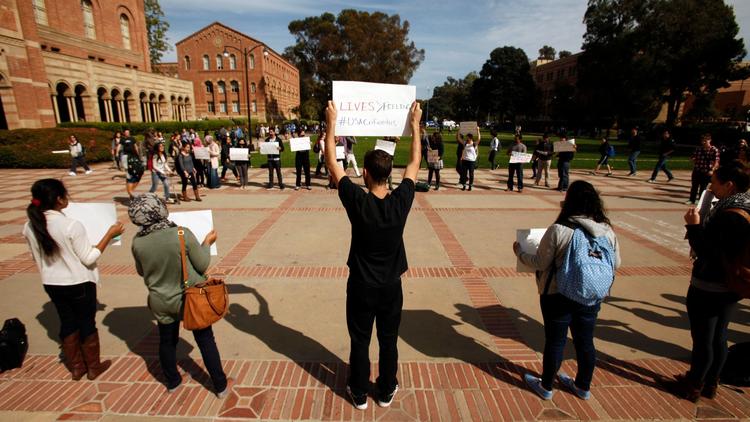By the end of 2016, the United Nations will have adopted 20 resolutions against the state of Israel and four resolutions against all other countries combined. Since 2012, university students in the United States have been almost as aggressive, introducing roughly 100 boycott, divestment and sanctions resolutions — also known as BDS — against Israel, and at best a handful of resolutions against all other nations combined.
Judging from this imbalance, it seems that U.S. students consider Israel the world’s foremost human rights violator — worse than Syria, China, Russia, Egypt, Sri Lanka, Kenya, Sudan, Bangladesh, Libya, Yemen, Zimbabwe, Pakistan, South Korea, Brunei, Somalia and Saudi Arabia.
Of course that’s ridiculous. Yet as a result of a sophisticated Palestinian nationalist campaign — plus a hefty dose of anti-Semitism — it’s modish for students to reserve their most extreme outrage for the U.S.’ chief ally in the Middle East. The pro-Israel side, meanwhile, has proved completely ineffective.
We’re losing in part because most pro-Israel organizations have a long history of supporting Israel, not fighting for Israel. They operate on the assumption that the best way to battle BDS is through education — a long-term solution that won’t work in the campus battles so long as pro-Israel faculty and students remain in the minority.
While almost all BDS strategies are offensive (literally and figuratively), anti-BDS strategies are reactionary and defensive. When BDSers introduce anti-Israel resolutions, pro-Israel students protest them. When BDSers accuse Israel of apartheid, genocide, racism and colonialism, pro-Israel students (correctly) argue that none of these labels is accurate.
The BDS movement is dictating the narrative and always striking the first blow.
Even when we “defeat” BDS resolutions and pop the champagne to celebrate, the BDS movement is already plotting its next attack. BDS’ only time frame is the destruction of Israel. For supporters, there are no defeats, just opportunities. When a BDS resolution fails, proponents will introduce another resolution within days, weeks or months, giving the movement more opportunity to spew propaganda against Israel and sway people to their cause.
It’s time to try something different. Here is a simple solution that will help end BDS on university campuses: Turn BDS into a meaningless acronym.
Pro-Israel students should take the offensive by introducing multiple divestment resolutions against companies that do business in human-rights violating countries. Students should use the same BDS resolutions previously introduced against Israel and change the wording from Israel to [offending nation], then list the grievances: state executions of homosexuals; burying alive or throwing LGBT people from buildings; female genital mutilation; governmental gang rapes; mass child labor deaths; ethnic cleansing and hacking to death of children and pregnant women; political gulags for dissidents and journalists; public stonings of adulterers.
If a university’s pension fund invests in McDonald’s, target McDonald’s for licensing restaurants in Saudi Arabia, where executions of homosexuals continue. If the fund prefers Starbucks stock, target Starbucks for operating coffee shops in Pakistan, or Brunei, or in China, which is occupying Tibet.
Pro-Israel students need to flood the educational landscape with the acronym BDS until every school in the nation has so many resolutions pending that campuses revolt. And they should look beyond their obvious allies. They should reach out specifically to anti-Israel BDSers who supposedly care about human rights. If those students refuse, publicize their hypocrisy.
Meanwhile, create Web platforms and social media campaigns in the dramatic and successful BDS style. Produce short films that highlight the offending countries’ extensive and deplorable human rights violations.
The more BDS resolutions that are introduced, the sooner BDS will lose its meaning, power and relevancy, and the quicker the war against Israel will end on university campuses. Next, go after unions and professional associations, such as the American Studies Assn., which thought that Israel — among all nations — was the only country worth boycotting in its 52-year history.
Whenever I’ve shared my ideas with pro-Israel students, they’ve had similar reactions: “Two wrongs don’t make a right” or “We should promote Israel rather than attack other companies and countries.” The first response is inaccurate because the resolutions against Israel generally trade in falsehoods, while the new resolutions against other countries will be factual. As for the second response, maybe it’s time for pro-Israel supporters to get some chutzpah.
University students have become pawns in a political and religious campaign against a democratic, fundamentally decent country. In the process, the BDS movement has shifted the spotlight away from unspeakable human rights violators and the intolerable suffering of their many victims. When we beat BDS at its own game, people who really need our help may well benefit the most.
Jack Saltzberg is the founder and executive director of The Israel Group, a nonprofit that protects Israel in the diaspora. He is working on a book about political warfare against Israel. Reach him at js@theisraelgroup.org.


